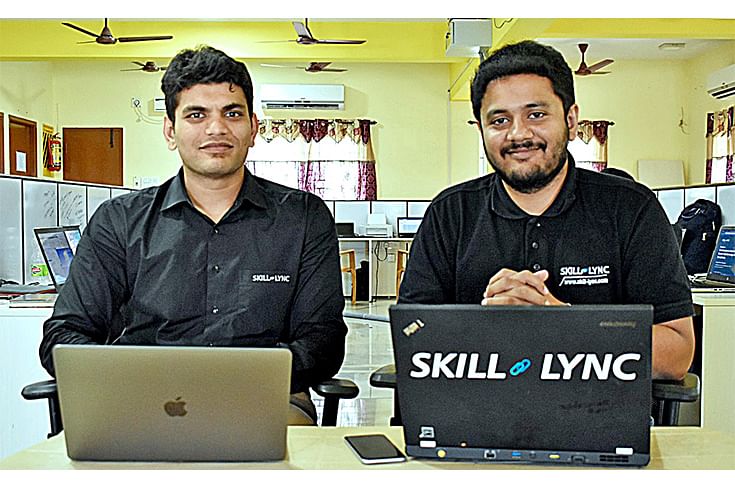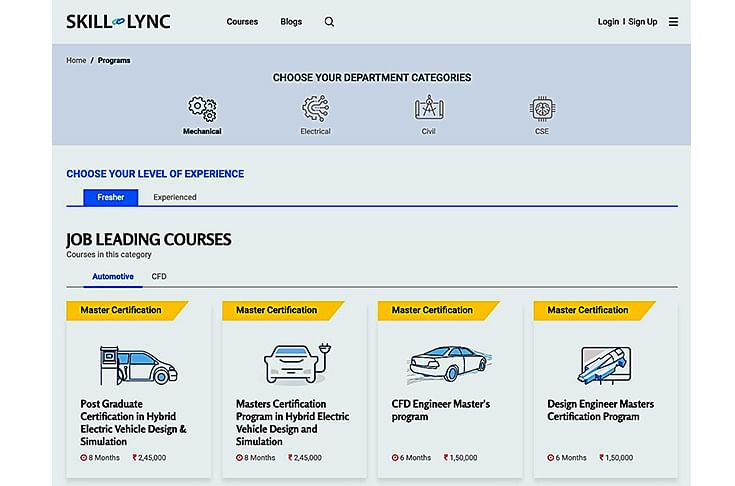Skill-Lync's online EV design and simulation course attracts industry
Chennai-based start-up introduces first such Masters course in India, is in talks with eight OEMs and two suppliers to upskill their engineers in EV technology.
Even as India battles the Covid pandemic amidst the lockdown still contunuing in many places, which has seen sizeable job losses and salary cuts, there will continue to be some jobs which will stand the test of time, at least in the near-term. These include skills in the domain of electric vehicles (EVs), which are set to occupy more space in the years to come.
At present, academic courses specialising in EVs are few and far between and while most of the engineering graduates in India are well versed in their theoretical knowledge, their practical understanding is arguably lacking. It is this vacuum that the Chennai-based online start-up, Skill-Lync seeks to fill by launching a Masters course in Electric Vehicle Design and Simulation. The company claims this is the first such curriculum in India that focuses solely on electric vehicles and will help produce EV engineers, a job profile that OEMs keenly seek.

Founded in 2018, the company was incepted by Sarangarajan V and Suryanarayanan P as a YouTube channel to share engineering tip. Even before the Covid-19 pandemic, the start-up realised the value of online classes and courses. With colleges shut and students looking to make the most of their time, the duo fast-tracked the development of this program.
“We both started skilling while we were in the US. The basic idea is that mechanical or electrical engineers have a lot of theoretical understanding. They do not possess application-based knowledge. This becomes a real disadvantage when they start their career and even to do their job efficiently. In 2016, we quit our jobs and moved here. Over these three years, we have focussed on mechanical engineering courses on fluid dynamics, design, multi-body dynamics, vehicles dynamics, electric vehicles and more,” says Suryanarayanan P, CEO of Skill-Lync.
Keeping the significant skill gap in mind, the company’s focus is to help non-software engineers accelerate their career. In India, more than 70 percent of engineers come from non-software fields.
“Previously, we started a course of Masters in Hybrid Electric Vehicle Design and Analysis. This concentrates on IC engine architecture and EV architecture. The course also had automobile aerodynamics, structural analysis and automobile vehicle dynamics. We had around 1500 students enrolled in the course and 200 students have graduated. Around 180 students have been placed with automobile OEMs. When the government and other companies try to transform ICE to EV or are trying to make the transition, we need a program to help the graduates in this new area. Based on this, we started the Masters certification program in EV Design and Analysis. It is mainly for electrical, electronics and instrumentation engineers,” mentions Suryanarayanan.
The company has partnered with major software providers like Mathworks, GT Suite and Ansys, which provide the tools to develop these courses. Skill-Lync also works with industry professionals who have worked at major OEMs like Ford and Scania to develop the modules.
Providing details about the eight-month course, Suryanarayanan says the new program is separated into two semesters with four major modules. The course starts with an introduction to hybrid EVs, their control and drive and ADAS using Matlab and Simulink softwares. There is a separate module that concentrates on battery technology and mathematical models and how the battery management system (BMS) works. Skill-Lync charges a fee of Rs 275,000, with an option of a full-time or part-time course. The company's target audience comprises fresh graduates between 19-25 years old.
What has given a fillip to Skill-Lync is its partnerships with major software companies, which allows it to provide the license for the students and enables them to learn these softwares. “Our course has 40 percent theory; 60 percent is on applying the course work in a particular tool. Recruiters now look for students who know how to use these softwares,” states Suryanarayanan.
“In the course, we also look into power electronics and design of BLDC motors. Once an engineer fresher or 2-3 years experienced professional goes through this, he will be able to integrate his theoretical understanding and apply that in any EV development. He can go into ADAS, battery or power electronics or motor design. Also, we keep updating the module once in six months,” points out the start-up's CEO.
Surayanarayanan adds, “We are looking to enrol only 1,000 students a year. With the kind of in-depth knowledge and the software partnerships we have, it does demand that price. The students see us as a bridge between the academy and the job."
Upskilling industry

The start-up is in talks with eight OEMs including Tata Motors and TVS Motor Co, and two automotive component suppliers to upskill their engineers on electric technology. It is also engaged in talks with ASDC (Automotive Skill Development Council) to explore the likelihood of partnering the latter for some additional courses.
“A number of OEMs are reaching out to us to help upskill their employees. The talks are at initial phases and nothing has been materialised yet. With the OEMs, we can train them in two different areas, namely the production unit and the tech team.” says Suryanarayanan.
Plugging into EV infra
Even as the start-up is seeing smart traction in its EV design and simulation course, it is now exploring the potential to develop one to cater to the EV infrastructure space. The company is bringing programs on smart chargers and fast charging systems. Skill-Lync is speaking to domain experts who can develop coursework on these and is also working on component-specific courses. “It is not available now. But we will be having it all in three months," says Suryanarayanan
Moving ahead
“We have high coverage in mechanical engineering courses. We want to make sure that we have the same in the EV space and assist component manufacturers and OEMs. Soon, we will have coursework on all domains. These will be across the globe. We are also in talks with a few partnering companies in the US. ” points out Suryanarayanan.
Enumerating on this, he says, “Europe and the US are concentrating more on the EVs and many will benefit in this course. Around 20 percent of our students are from the US and Europe. Also, we have around 1,000 students in the EV course and 4,500 in mechanical courses now. We want to increase the number to 10,000 by 2020-21.” From the manner in which the young start-up is charting its course of action, it looks to be a plug-and-play affair over the next few years.
RELATED ARTICLES
Policy, Protectionism and Pressure: Inside India’s Construction Equipment Downturn
India’s construction equipment sector faces a tough battle as it takes on cheaper imports from China and a slowdown in g...
Beyond Cars: VinFast's Full-spectrum EV Push in India
With $2 billion committed, VinFast is constructing an integrated play spanning cars, scooters, buses, ride-hailing and c...
A Breather for Hero
A combination of policy tailwinds, new products and Honda’s cautious approach on EVs put a stop to the constant encroach...






 04 Jun 2020
04 Jun 2020
 24728 Views
24728 Views





 Shahkar Abidi
Shahkar Abidi


 Kiran Murali
Kiran Murali


